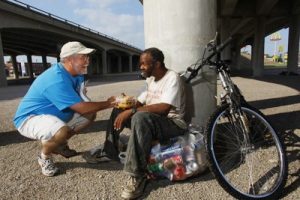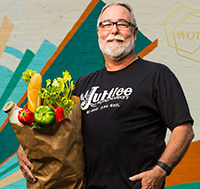Church Under the Bridge evaluates disability inclusiveness
Even a church that prioritizes ministry to the marginalized can improve how it makes people with disabilities feel more accepted and included, Pastor Jimmy Dorrell discovered.
His congregation—Church Under the Bridge—meets beneath the I-35 overpass near the Baylor University campus each Sunday, serving the unhoused, the mentally ill, the poor and ex-offenders.
“It’s who we are and have been from the beginning 31 years ago,” he said. “It is what we believe Scripture calls all churches to do.”

Dorrell recently participated in a workshop offered by the Baylor Center for Developmental Disabilities where church leaders were asked to evaluate how their congregations help people with mental and physical disabilities feel they “belong.”
“That’s my world,” Dorrell said. “But I still came away feeling convicted. There are areas I know need to be changed.”
Many people on the margins—including those with a variety of mental and physical disabilities—have discovered acceptance and welcome at Church Under the Bridge, he noted.
“Yet the most difficult question for me was, ‘Are they allowed to help lead and use the gifts God gave them in some way?’ ‘Belonging’ is much more than ‘welcomed,’ and we must move toward ‘empowered,’” he said.
In spite of all that Church Under the Bridge does to be inclusive, Dorrell said the workshop helped him to see his own “ministerial paternalism.”
“Most clergy and churches care deeply about fostering accessible worship environments. Yet, even the most caring churches can encounter barriers to facilitating worship services in which everyone can participate fully and meaningfully,” he said.
“Those with mental/emotional disabilities, including neurodivergent individuals such as autistic people, are often overlooked even in well-meaning worship contexts. What does it mean to facilitate corporate worship environments in which all truly belong?”
Listening and learning from survey
So, Dorrell developed a simple 11-question survey particularly for worshippers at Church Under the Bridge who self-identify as “disabled.”

The week before conducting the survey, he preached on biblical characters who had a variety of disabilities—Jacob’s limp, Moses’ stutter, Paul’s thorn in the flesh—and others who may have, such as Ezekiel, who might have been schizophrenic.
Melody Escobar, a postdoctoral research associate with the Baylor Collaborative on Faith and Disability, helped Dorrell review, tabulate and analyze the survey results.
Forty-one people—about one-fourth of the congregation— responded to some or all of the questions. Of those who responded, 20 are men, and 21 are women. The average age of respondents was 57.
By far, the most encouraging response was to the question, “Do you feel accepted and included by most people in our church?” Of the 38 who answered the question, 36 said, “Yes.”
“That was reaffirming. It’s the beauty of what God has given us at Church Under the Bridge,” Dorrell said.
One-third of those who responded have received tangible assistance from Church Under the Bridge, such as clothing, food, housing, transportation, financial aid or help in finding employment.
Not surprisingly, 39 worshippers mentioned transportation as a challenge. Recently, Church Under the Bridge purchased a second bus that is wheelchair accessible, and 36 percent of those who responded to the question use that service. About one-fourth (26 percent) walk to worship services at Church Under the Bridge, and 7 percent ride a bicycle.
For the 26 percent who drive to the services in their own cars and the 5 percent who ride with someone else, Baylor University makes parking available in the lot of its new Mark and Paula Hurd Welcome Center.
“It’s exactly 300 steps away,” Dorrell said. Church Under the Bridge has a golf cart available to transport those who have mobility issues from the parking lot to the worship space under I-35.
When asked about the worship experience at Church Under the Bridge, 13 of the 25 who responded said it is “good as it is.”
Addressing areas that need improvement
Even so, the survey helped the church identify areas for improvement.
Some respondents pointed to a need for transportation from area nursing homes. Others said the sound system at the outdoor worship services is too loud for them.
One key area the survey identified that Church Under the Bridge already plans to address is making the portable toilets more accessible for people in wheelchairs.
Dorrell noted the church also will set aside a designated area for people in wheelchairs during the worship services to make their entry and exit easier.
He said the Baylor Collaborative on Faith and Disability workshop and further discussions with Escobar also helped him understand better some of the coping mechanisms worshippers—particularly those on the autism spectrum—already have been using at Church Under the Bridge.
For instance, some who need sensory stimulation or stress relief already are using handheld fidget toys during worship. Others, who are uncomfortable in the middle of large crowds, already isolate themselves at the outer edges of the worship space.
Dorrell—who is naturally demonstrative and affectionate—also was reminded he needs to ask permission before hugging, because some people on the autism spectrum are uncomfortable with physical contact they do not initiate.
“It’s a good reminder for me to give grace,” he said. “We can affirm what is happening naturally instead of asking why some things are not happening. We can bless the ways people already have found to make themselves more comfortable.”